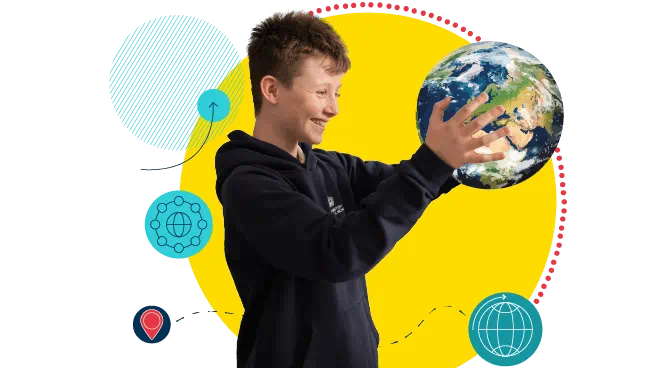Intelligence is often defined by performance in an examination or grades at school, but at Nord Anglia Education we understand it goes beyond that. Although having useful knowledge and skills does contribute to a person’s intelligence, psychologist Howard Gardner’s Theory of Multiple Intelligences suggests that there’s more to being intelligent than simply being good at maths and English or learning a second language.
At our schools, we deliver a curriculum where children can develop these nine types of intelligence and learn their strengths and weaknesses, helping them understand their place in the world and decide which career they would like to pursue. In this blog, we will discuss the nine types of intelligence listed in Gardner’s research in more detail, and list the characteristics of each to help people understand which of the nine types of intelligence they possess.
What is the Multiple Intelligence (MI) Theory?
Howard Gardner’s theory of multiple intelligences proposes that humans are not born with all the intelligence they will ever have, and that everyone processes information in different ways. In other words, we continually learn and develop in different ways throughout our lives, even after we finish formal education.
Gardner does not define intelligence as one single, general ability, but instead he divides it into nine different intelligences. While someone might be particularly strong in one area, such mathematical intelligence, they will actually possess a range of abilities across several intelligence types.
What are the nine types of intelligence?
Howard Gardner’s nine types of intelligence include:
- Logical-Mathematical Intelligence
- Linguistic Intelligence
- Interpersonal Intelligence
- Intrapersonal Intelligence
- Musical Intelligence
- Visual-Spatial Intelligence
- Bodily-Kinaesthetic Intelligence
- Naturalist Intelligence
- Existential Intelligence
1. Logical-Mathematical Intelligence
Perhaps the most obvious of the nine types of intelligence, logical-mathematical intelligence refers to someone’s ability to solve mathematical problems, spot trends and patterns, and understand relationships. If someone possesses logical-mathematical intelligence it means that order and sequencing feature greatly in their thinking process and they can think conceptually and abstractly.
You have high logical-mathematical intelligence if:
- You’re good with numbers and confident taking on tasks that involve quantifying things, such as math and arithmetic questions
- You enjoy performing experiments and conducting your own investigations
- You enjoy playing logic and strategy games
- You enjoy solving puzzles and unravelling mysteries
- Your curiosity drives you to ask cosmic or deep questions
- Great careers for people with logical-mathematical intelligence include mathematician, economist, auditor, accountant, scientist, tactician, computer analyst and technician
2. Linguistic Intelligence
Linguistic intelligence gauges someone’s ability to use words effectively. This doesn’t necessarily mean learning another language, someone who exclusively uses one language proficiently can still have linguistic intelligence. Being able to use the right words and express what you mean is a unique skill type of intelligence that can be utilised in several different scenarios.
You have high linguistic intelligence if:
- You’re comfortable both speaking and writing, using words to achieve objectives such as persuasion
- You have a broad vocabulary and understand when and how to use certain words
- You enjoy reading and writing
- You enjoy playing word games
- You have an easy grasp of other languages or dialects, fluency is not required
- Great careers for people with linguistic intelligence include public speaker, librarian, politician, radio announcer, TV host, YouTuber, journalist, lawyer, curator, speech pathologist, writer or sales
3. Interpersonal Intelligence
Interpersonal intelligence or emotional intelligence refers to the link between intelligence and emotions. Someone with interpersonal intelligence is good at sensing other people’s emotions and reading their motives, this can be linked to both verbal and non-verbal communication skills.
You have high interpersonal intelligence if:
- You’re good at identifying distinctions and differences among a group of people
- You have a wide circle of friends and are comfortable meeting new people
- You are good at sensing people’s mood
- You possess the ability to look at things from different perspectives, understanding other people’s point of view
- Great careers for people with interpersonal intelligence include human resources, counsellor, management, psychologist, public relations, social director, teacher or social worker
4. Intrapersonal Intelligence
Intrapersonal intelligence refers to self-awareness and people’s ability to understand themselves. Do you understand what you are feeling and why you are feeling it? Intrapersonal intelligence also involves appreciating and respecting the human condition, in general, treating others the way you would like to be treated yourself.
You have high intrapersonal intelligence if:
- You’re self-motivated and can put yourself first when necessary
- You’re strong-willed and independent
- You’re aware of, and take action based on how you’re feeling
- You enjoy taking time to yourself for self-reflection
- Great careers for people with this type of intelligence include psychologist, writer, therapist, counsellor, social worker, theologian, entrepreneur or poet
5. Musical Intelligence
Musical intelligence is the most self-explanatory of the nine types of intelligence, it refers to someone’s ability to sense rhythm and sound and use this to create music.
You have a high level of musical intelligence if:
- You can break the pitch, rhythm, tone and timbre of sounds easily
- You recognise, create or reflect on music, and love doing so
- You are comfortable with music playing in the background while you do other things
- You are highly sensitive to sounds, hearing what others miss
- Great careers for people with musical intelligence include conductor, musician, piano teacher, composer, dance teacher, music therapist or choral director
6. Visual-Spatial Intelligence
Visual-spatial intelligence refers to people’s ability to view or visualise the world in its three dimensions. When discussing visualising the world in 3D, it involves the following capabilities:
Mental imagery – being able to draw up an image or picture without an external stimulus, drawing from memories or previous experience. In other words, the detail of someone’s imagination.
Spatial reasoning – being able to think about objects in 3D and draw generalisations despite having limited information. Mention a pyramid, and people with visual-spatial intelligence will be able to visualise how that pyramid will look from the front or the top.
Image manipulation – being able to visualise changes to an image before they have been implemented. For example, an artist visualising how their picture will look before they have drawn it.
Artistic skills – being able to create artwork, this also includes graphic skills.
Visual-spatial intelligence and creativity work hand-in-hand, drawing on an active imagination to produce impressive visual work.
You have high visual-spatial intelligence if:
- You have a high awareness of your surrounding environment
- You have a good sense of direction
- You enjoy playing jigsaw puzzles and games based around navigation
- You daydream a lot
- You enjoy being creative
- Great careers for people with this type of intelligence include architect, geometry teacher, engineer, surveyor, urban planner, graphic artist, interior decorator, photographer, pilot or cartographer
7. Bodily-Kinaesthetic Intelligence
Bodily-kinaesthetic intelligence refers to mind and body co-ordination and is very important in athletes. Athletic ability isn’t often referred to as intelligence, but kinaesthetic intelligence is measured on someone’s ability to use their physicality to manipulate objects and other elements around them.
You have high bodily-kinaesthetic intelligence if:
- You recognise your capabilities and physical limits
- You can communicate well using body language, using gestures and actions to convey your message
- You have no real issue with physical contact
- You have a good sense of timing when it comes to physical tasks and activities
- You can handle objects with a high degree of deftness, control and economy of movement
- You like being creative with your hands
Extra-curricular and sports activities are a fantastic way of improving your bodily-kinaesthetic intelligence. These activities not only provide a space to develop practical sport skills, but also develop important social skills and generally boost academic performance.
Great careers for people with bodily-kinaesthetic intelligence include physical therapist, dancer, athlete, coach, fitness instructor, gym owner, actor, mechanic or carpenter.
8. Naturalist Intelligence
Naturalist intelligence refers to the ability to read and understand nature. Having sensitivity to the non-living elements of all living things is considered “nature smart”.
You have high naturalist intelligence if:
- You love nature and spending time outdoors
- You connect easily with animals
- You’re good at raising or taking care of animals and plants
- Great careers for people with naturalist intelligence include botanist, oceanographer, camp counsellor, scout troop leader, gardener, astronomer, meteorologist, geologist or landscape architect
9. Existential Intelligence
Existential intelligence refers to deep sensitivity and people’s ability to handle deep questions such as the meaning of existence, it’s one of the most complex of the nine types of intelligence listed in Gardner’s research. People with existential intelligence are not only comfortable talking about these serious questions but also strive to find the answer.
You have high existential intelligence if:
- You genuinely want to find answers to questions such as “what is the meaning of life?” or “what happens after death?”
- You demonstrate high sensitivity on matters related to human existence
- Great careers for people with existential intelligence include inspirational speaker, writer, clergy, author, philosopher, economist or blogger.
This article should help you better understand the nine types of intelligence and where your own strengths and weaknesses lie. If you’d like to learn more about how we consider the different types of intelligence at Nord Anglia Education, you can explore our school curricula and unique learning approach on our website.








.jpeg?h=1066&iar=0&w=1600&rev=7196eef1aad64a45a4b6f6433d69b0c3&hash=2775A262AD2AC7991291B8B5D32772D3)

